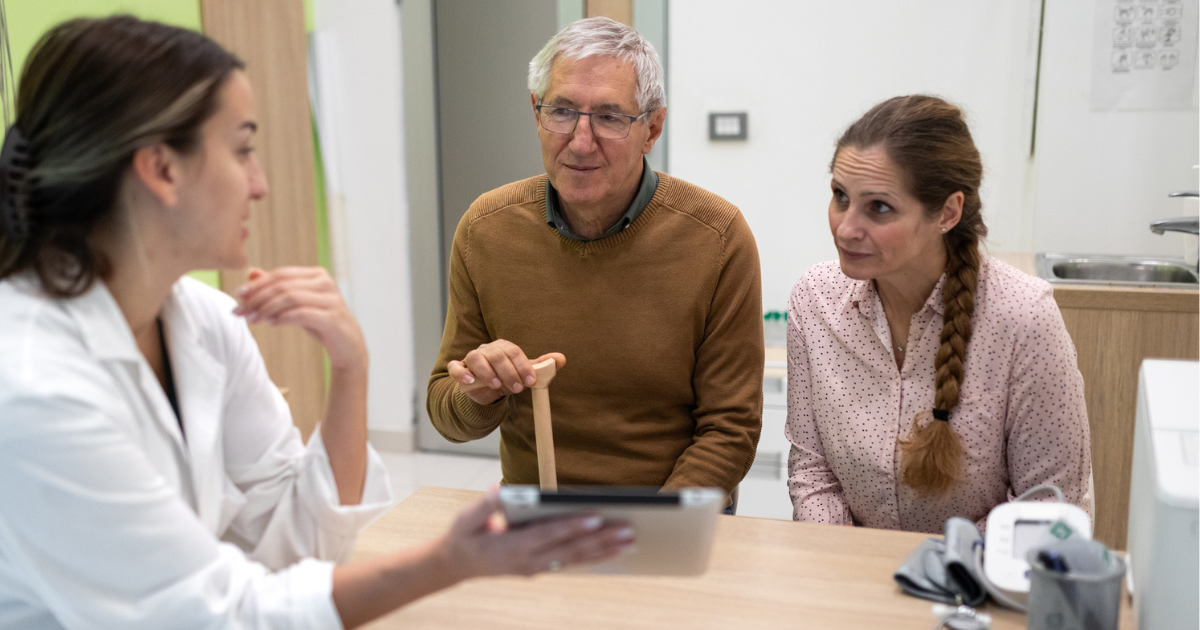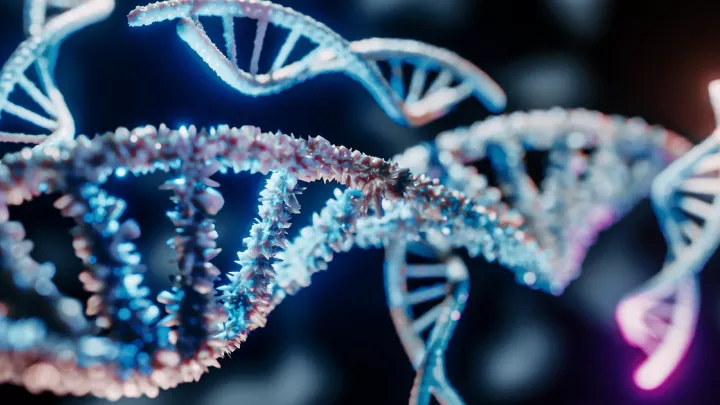What is Lynch syndrome, and how does it affect your cancer risk?

Lynch syndrome is an inherited predisposition that increases the lifetime risk of certain types of cancer. It is caused by a genetic variant that affects the body's ability to repair DNA changes or errors that occur during replication. With Lynch syndrome, these mistakes may go uncorrected, potentially leading to cancer.
Lynch syndrome runs in families in an autosomal dominant inheritance pattern, meaning if one parent has the gene variant, there’s a 50% chance of passing it on to their children.
“No Lynch gene variant is associated with 100% chance of developing cancer,” adds medical oncology physician assistant Amanda Bond, PA-C. “Even if you’re tested and identified to have one of these gene changes, it does not mean that you’ll develop cancer in your lifetime.”
Although Lynch syndrome isn’t common in the context of all cancers, it is the most common type of inherited cancer syndrome, affecting about 1 in every 280 people (1). Lynch syndrome research dates back to the late 1800s when certain cancer-prone families were first identified. The condition got its name from Dr. Henry Lynch, who was pivotal in studying and defining this hereditary cancer syndrome.
“Since Lynch syndrome is something you are born with, it’s not something that you can contract or acquire later in life,” says genetic counselor Jessie Poskochil, MGC, CGC. “Knowing you have it helps physicians be proactive and helps you feel empowered to make the best possible health decisions.”
How does Lynch syndrome affect your cancer risk?
Your DNA is unique and can provide insight into potential health risks. Five genes are associated with Lynch syndrome, and each gene has different cancer risks, but a general pattern is seen with most of the Lynch genes.
If three or more relatives on the same side of a family have had Lynch-associated cancers, especially under age 50, genetic testing can be beneficial.
“Most people think about colorectal cancer as the biggest cancer risk associated with Lynch syndrome,” says Bond. “But we're also talking about screening for other cancers that may be lower risk but higher than the general population when an individual has Lynch syndrome. We can see uterine, ovarian, ureter and bladder cancers, small bowel, gastric, and biliary tract cancers also associated with Lynch syndrome. Some Lynch genes have also been associated with pancreatic and prostate cancers. Rarely, we see sebaceous carcinomas of the skin and brain cancer in Lynch syndrome carriers.”
The importance of knowing your family history
Knowing your family history of cancer can be lifesaving, as it can indicate a need for a more intensive screening schedule and discussing preventive options with your doctor.
“It’s crucial for patients to share an accurate family history with their primary care providers before their annual physical,” says Bond. “Include anyone in the family who has had cancer, what type, and the age of diagnosis. Ask if any screenings should be more frequent, and if genetic testing is an option, ask for a referral to meet with a genetic counselor.”
Can Lynch syndrome skip a generation?
“No, but it can sometimes appear that way,” says Poskochil. “With Lynch syndrome, you only need one copy of the altered gene to have a higher risk for cancer. And so, when you have children, there's a 50% chance you pass on the working or nonworking copy to each child. Sometimes, people inherit a Lynch syndrome variant but may never develop cancer, which is why it can appear to skip a generation.”
Genetic testing for Lynch syndrome
“If you think about your DNA as being many letters, this testing spell checks your DNA,” says Poskochil. “Testing looks at genes specifically related to cancer and spell checks them thoroughly to see if any missing letters, extra letters, or different letters would make a gene not work as expected. If test results are positive for something, you’ll be referred to a genetic counselor like me to review the results and what they mean.”
Genetic testing involves a blood or saliva sample. Your primary care physician can order the test or refer you to a genetic counselor; the results typically take two to three weeks.
Genetic counselors play a key role
Genetic counselors provide education, guidance and recommendations for screening and prevention. They also help coordinate care with cancer risk and prevention specialists and other physicians, such as oncologists.
If you’re considering genetic testing, look to the professionals to receive accurate results. “If you have a personal or family history of cancer, we recommend testing with a licensed and certified genetic counselor rather than a commercial test you sign up for yourself,” says Bond. “Avoid commercial tests you find online as they may not test the at-risk genes you need to be tested. We order specific gene testing based on family history, which is much more reliable.”
The advantage of genetic testing
Genetic testing may help physicians intervene early and prevent cancers by offering more frequent screening and considering surgeries or medications to reduce risk. “We're offering a more individualized cancer screening plan, talking about prevention, and maximizing everything we can do to help lower a patient’s cancer risk and the risk of dying from cancer once we know what those risks are,” adds Bond.
The Genetic Insights Project (IRB# 0645-23-CB)
Nebraska Medicine is partnering with Helix on the Genetic Insights Project. This research study analyzes 11 high-risk genes associated with Lynch syndrome, BRCA1 and BRCA2 genes (hereditary breast and ovarian cancer genes), and hypercholesterolemia genes (a cause of heart disease). The main aim of the research is to allow scientists and physicians to learn more about the role of genetics in disease. But individual results from the genetic screening may also empower participants to understand their genetic risks and take proactive health measures. It’s a great place to start if you’re interested in genetic screening. Principal Investigator: Douglas Stoller, MD, PhD – University of Nebraska Medical Center.
- Georgiou D, Monje-Garcia L, Miles T, Monahan K, Ryan NAJ. A Focused Clinical Review of Lynch Syndrome. Cancer Manag Res. 2023 Jan 18;15:67-85. doi: 10.2147/CMAR.S283668. PMID: 36699114; PMCID: PMC9868283.







